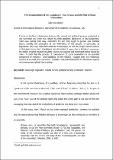Files in this item
The inconvenience of the legislator’s two persons and the role of good counsellors
Item metadata
| dc.contributor.author | Slomp, Gabriella | |
| dc.date.accessioned | 2017-06-23T23:33:22Z | |
| dc.date.available | 2017-06-23T23:33:22Z | |
| dc.date.issued | 2016 | |
| dc.identifier | 231586977 | |
| dc.identifier | 48634a80-5317-42d7-9e45-8b964f925262 | |
| dc.identifier | 84955364313 | |
| dc.identifier | 000377025800005 | |
| dc.identifier.citation | Slomp , G 2016 , ' The inconvenience of the legislator’s two persons and the role of good counsellors ' , Critical Review of International Social and Political Philosophy , vol. 19 , no. 1 , pp. 68-85 . https://doi.org/10.1080/13698230.2015.1122355 | en |
| dc.identifier.issn | 1369-8230 | |
| dc.identifier.other | ORCID: /0000-0003-4596-5992/work/76774695 | |
| dc.identifier.uri | https://hdl.handle.net/10023/11073 | |
| dc.description.abstract | I focus on Hobbes’s distinction between the natural and political persons embodied in one sovereign and show that, driven by their passions, ignorance, or bad judgement, rulers qua natural men may undermine the end they ought to pursue qua political actors, namely the protection of the well-being of the people. In particular, as legislators, they may make laws that are unnecessary, or that the people cannot endure, or that give rise to their impatience and discontent. I argue that in Hobbes’s argument, the notion of good counsel provides a safety net against bad commands being issued by rulers. I claim that the process of consultation of good counsellors is an essential component of Hobbes’s understanding of law-making. I suggest that the Hobbesian notions of counsel and counsellor provide a valuable framework to illuminate aspects of contemporary global law-making. | |
| dc.format.extent | 375776 | |
| dc.language.iso | eng | |
| dc.relation.ispartof | Critical Review of International Social and Political Philosophy | en |
| dc.subject | Sovereign | en |
| dc.subject | Legislator | en |
| dc.subject | Natural person | en |
| dc.subject | political person | en |
| dc.subject | Command | en |
| dc.subject | Counsel | en |
| dc.subject | B Philosophy (General) | en |
| dc.subject | JZ International relations | en |
| dc.subject | JX International law | en |
| dc.subject.lcc | B1 | en |
| dc.subject.lcc | JZ | en |
| dc.subject.lcc | JX | en |
| dc.title | The inconvenience of the legislator’s two persons and the role of good counsellors | en |
| dc.type | Journal article | en |
| dc.contributor.institution | University of St Andrews. School of International Relations | en |
| dc.contributor.institution | University of St Andrews. Institute of Legal and Constitutional Research | en |
| dc.contributor.institution | University of St Andrews. Centre for Global Law and Governance | en |
| dc.identifier.doi | 10.1080/13698230.2015.1122355 | |
| dc.description.status | Peer reviewed | en |
| dc.date.embargoedUntil | 2017-06-23 |
This item appears in the following Collection(s)
Items in the St Andrews Research Repository are protected by copyright, with all rights reserved, unless otherwise indicated.

